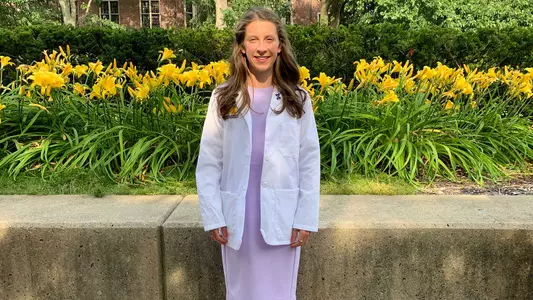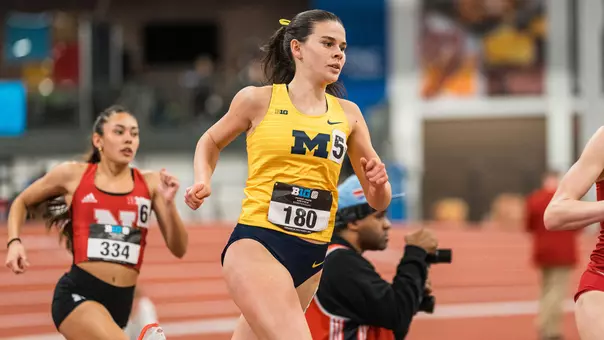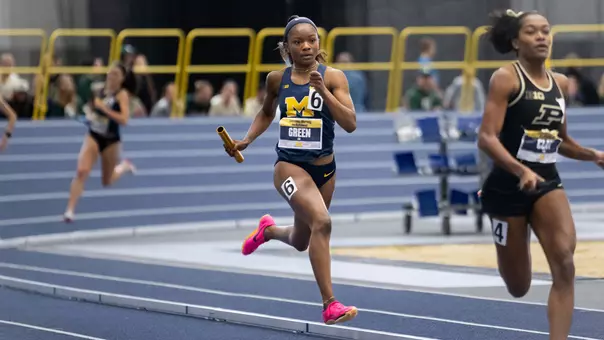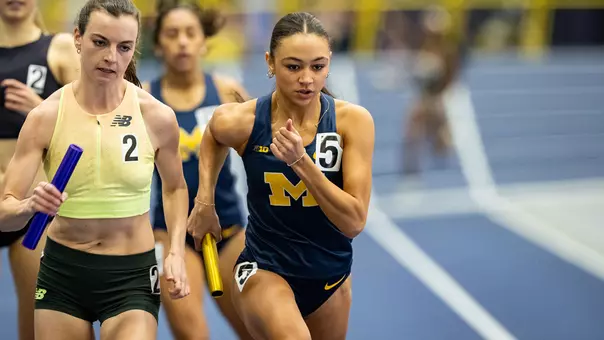
Med Student Finn Helps Design COVID-19 Class While Training for Olympic Trials
5/14/2020 1:30:00 PM | Women's Track & Field, Features
By Steve Kornacki
ANN ARBOR, Mich. -- Erin Finn is accustomed to being ahead of the pack.
She holds the University of Michigan women's track and field record in four separate long-distance races, was a 10-time Big Ten champion, and a four-time runner-up in NCAA finals races.
Finn, a finalist for the 2017 Sullivan Award as the nation's top amateur athlete, concluded her collegiate career as a nine-time All-American in last June's NCAA outdoor championships.
But she's far from done running or with her studies. Finn is training to qualify for the Olympic marathon, and is a first-year medical student at her alma mater.
She recently completed a two-year master's program at Michigan in public health and epidemiology -- a branch of medicine that deals with the incidence, distribution and control of disease in a population. Those working in that area have been in high demand ever since the COVID-19 pandemic put the world on hold more than two months ago.
Finn choosing to study epidemiology more than two years ago put her ahead of the pack once again, this time as a scientist and aspiring physician.
"I guess I kind of read the writing on the wall a little bit," said Finn, "and that's why I went into epidemiology before. I didn't study infectious epidemiology. But a lot of these things I studied, kind of looking for cause and effect, does really help me understand the literature surrounding looking for a cure and vaccines.
"So, I've been able to understand a lot of the research going into caring for people with COVID, and why there has to be a methodical approach to how to search for an effective drug. And why those vaccines, even if they are created quickly, need to go through a certain methodical research process to make sure what the effects are and if there are any negative side effects. So, it's really been helpful in that arena. That's been the most important thing that my studies have prepared me for this pandemic."
She was focused on becoming a pediatrician after getting her undergraduate degree as a biochemistry major, but saw the need to study disease control.
"I knew I wanted to go into medicine," said Finn, "but I also knew there was a lot I needed to learn outside of standard medicine to be the best caregiver I could be. That's really where public health comes in. It really revealed to me how much bigger health is than the downstream focus on medicine."
She gained a greater knowledge of general health, vaccinations, nutrition and the social aspects of health care.
"Getting my MPH (master's in public health) really enabled me to become a better scientist, and I want to make research a part of what I do in the future. I want to make discoveries and make lasting change that will be effective, rather than just the scope of my practice. It is so vital to providing adequate care, especially in a global world where a pandemic can happen. I'm excited that it's gaining traction."

Finn and Big Bird at C.S. Mott Children's Hospital
Her passion for studying epidemiology and knowledge in the field brought another significant honor for Finn, winner of the 2018 Big Ten Medal of Honor designated for one male and one female in each senior class who best exemplifies excellence in both academics and athletics.
"I was actually invited to help create a course for the second- and third-year medical students that explains what epidemiology is and how it can affect a physician's practice of medicine in this current pandemic or in general," said Finn. "So, I was really fortunate to be one of the curriculum creators. It was a whirlwind, and we had to do it all in about two or so weeks. It was a crazy couple of weeks, but the course (COVID-19 Pandemic Elective) is open and students are currently taking it.
"It was definitely a big honor. I'm really, really happy that I was asked. And I was really excited that I had something to contribute. I just received a note of commendation from our dean, and that was really, really cool."
What are the most important elements of that class?
"There are five big chapters with the overall goal to give students a primer on what epidemiology is and why it matters for physicians," said Finn. "We used the current climate of the pandemic to frame the course, but really wanted to get to the broader strokes of epidemiology and how it helps informed care. That has a lot more to do with some of the things I was able to study in epidemiology. Just like social determinants of health and upstream factors in influencing care.
"The first chapter is an overview on pandemics in the world. The second chapter was about physician response at the bedside. The third chapter was communication and mental health in a pandemic. The fourth was more of a bigger focus on epidemiology, and the fifth chapter was a focus on evidence-based medicine."
Is there something significant the general public is missing in the COVID-19 story that somebody with her background can see?
"A lot of people are looking for an instant cure or an instant vaccine," said Finn. "But something that's super important is that the way science works is you are constantly trying to disprove theories. So, in trying to find a drug that might cure COVID, it's essential to perform studies looking for ways in which that drug might falter and not work.
"These studies take time to approve a vaccine to make sure it works and doesn't have any serious consequences. It's important that people understand that this is a process that takes time. Scientists in labs are working very hard at it, and there might not be immediate results. You can't put a (target) date on these things."
She said the other "big thing" to consider is that "improprieties exist in care" for COVID-19 patients along "minority lines that are unacceptable" and she hopes quality of care for all can be brought about.
What's most important to consider as social restrictions are relaxed and eventually lifted?
"I don't have enough research knowledge to make an informed decision or recommendation," said Finn. "I haven't done the modeling. I defer to people who have done that, and the CDC (Centers for Disease Control and Prevention) is still recommending we keep social distancing until we've met certain requirements.
"So, while it's important for people to take care of their mental health and be working, and take care of other medical issues, it's important to be judicious. Just because restrictions are lifted doesn't mean you have to go crazy and be at big social gatherings. We need to be conscious of the groups we're in, and how often and how many people we're seeing. We still have to take care to not spread the disease as much as we can.
"We need to do as much as we can for as long as we can to protect as many people as we can."
Finn is quarantined in Ann Arbor with her roommates and taking classes online. She has a "big final exam" this week and is taking classes through July. Then she'll resume studies in September, hoping that things "are a little more normal then."

Finn doing her road work on a run through the Nichols Arboretum
She's also training for the Olympic marathon trials.
"My goal was running at the trials in the 10K (6.2 miles) this year," said Finn, "but that's all obviously been delayed. Now my goal is to train to the best of my abilities and then hopefully qualify for the marathon trials."
Finn is Michigan's record holder in the indoor 3,000 meters (8:58.69), indoor 5,000 (15:23.16), outdoor 5,000 (15:26.08) and outdoor 10,000 (32:00.46). She's also the only woman in collegiate history to run 15:30 or faster in two consecutive NCAA Indoor Championships 5,000-meter finals.
What prompted Finn to attempt qualifying for the 26.2-mile marathon, which is 20 miles beyond her longest college distance events?
"I just think I'll be better at the marathon than the 10K, and that is a real motivator," said Finn. "I enjoy that kind of work, and those kind of workouts. Training on the road for road races is a lot more conducive to a med student life than training for the track. It requires different energy systems and different times of days, and it's easier to fit in than that super-intensity track work.
"I haven't run any marathons, but it's always been a goal of mine. I've always been a distance machine, a little aerobic engine, and I've always been excited for when I'd be able to transition to the marathon. One good thing about (these times) is that I've been able to make the transition earlier than I would've otherwise."
She is able to go on early-morning runs before classes, and also does not need to drive to the track. She can simply take to the roads and parks near where she lives. Then Finn can focus the rest of her day on being a medical student.
"I'm super thankful for all Michigan has done for me," said Finn. "From being an undergrad and what athletics taught me, and working through athletics, and how I've journeyed through public health, and now being able to fulfill my dreams at Michigan both academically and athletically.
"And if that's not the dream of the Michigan woman or Michigan man, I don't know what is."

Erin poses with her parents, Jeff (left) and Lori (right), in the Ingalls Mall after her white coat ceremony last July at Hill Auditorium.
Finn is close to realizing her longtime dream of becoming a doctor just like both her mother, Lori, in internal medicine and pediatrics, and father, Jeff, working in internal medicine.
"I've had a couple of moments where it's really hit me," said Finn, 25. "One of them was at our white coat ceremony, where we got our medical white coats, and I took some pictures with my mom and dad in their doctor white coats. Both my parents are physicians, and so I'm following in the family business.
"And a couple of weeks ago, I texted my friend, 'Wow! I'm going to be a doctor.' It just hit me. I'm really following my dreams."
Finn, like other first-year medical students, is focusing on "the classroom part of the curriculum" before beginning her experience of learning in the University of Michigan Hospital in the second year.
"I have loved everything I've studied -- and that's not an exaggeration," said Finn. "At this point, I don't know what I want to do. But that's what will be really exciting about my second year, when we're rotating. I'll get a better sense for where I fit in."
She's still strongly considering pediatrics. However, her foray into epidemiology has provided a more vast understanding of medicine, and it's purpose, and tied very closely into the challenges being experienced during a time of pandemic.
Finn is not only personally staying ahead of the pack, but enabling her fellow medical students to do likewise by better understanding COVID-19 in the class she helped design. And, all the while, training for an Olympic berth.
She's what "leaders and best" is all about.











